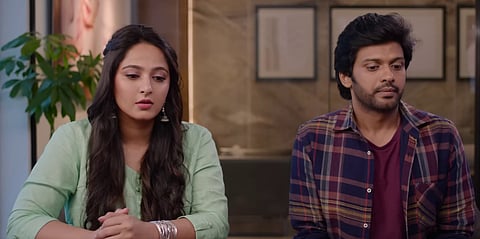Miss Shetty Mr Polishetty review: Naveen’s comedy shoulders this faltering romcom
Miss Shetty Mr Polishetty review (Telugu)(3 / 5)
Even if it’s the 864th time that you’re watching a movie end with someone racing across a city towards the love of their life after realising that they don’t want to lose them, even if it took some really impractical but happy coincidences to help them get there, you could still tear up and eagerly root for them — but only if the emotional heft of the 100-odd minutes that came before had you wholeheartedly invest your emotions in them. As Miss Shetty Mr Polishetty (MSMP) nears its end, the film would’ve evoked many laughs, and even got viewers to deeply care about both Siddhu (Naveen Polishetty) and Anvitha’s (Anushka Shetty) careers, hopes, and happiness. But whether their ‘happily ever after’ is spent together or apart feels rather inconsequential.
With MSMP, Anushka returns to the big screen in a lead role after almost five years as master chef Anvitha Ravali Shetty, an ice queen with a steely resolve to never fall in love or marry. Her no-nonsensical yet warm personality is underlined by her subdued pastel clothes and mostly-impassive air. When her delightfully endearing mother (played by Jayasudha) passes away, the newly-orphaned Anvitha decides she wants companionship, but only the kind she shared with her mother. She chooses to have a child through intrauterine insemination, and is as meticulous in her demands from the sperm donor as she is with her recipes. Her long list of requirements – someone who is funny, handsome, smart, passionate, broad-minded, conscientious, healthy, and of good ‘heredity’ – brings her to Siddhu Polishetty, an engineer/stand-up comic who ticks most of her boxes.
Like Annu Kapoor’s fertility specialist in Shoojit Sircar’s Vicky Donor who stalks Ayushmann Khurrana to make sure he’s the ideal sperm donor, Anvitha does a similarly extensive background check to vet the equally unserious male lead of MSMP. (Another point that both films have in common is that they seem to think gay men are unfit to be sperm donors, despite no such restrictions in Indian law). Naveen is effortlessly witty and charming as Siddhu, playing the office clown who is emotionally gullible, vulnerable, and willing to fix bad behaviour.
It’s Naveen’s comedic instincts that largely shoulder the film. His character Siddhu’s stand-up comedy bits fit in seamlessly with his journey, and even when they aren't exactly side-splitting, they offer insights into how he’s dealing with his emotions. But the actor falters when it comes to the romance, perhaps partly due to debutant director Mahesh Babu P’s inadequate writing. He has to spell out that he is falling for Anvitha (“She has a heartful laugh”), and later, he has to explicitly tell us he’s experiencing “love failure”. Without these cues, it’s almost easy to miss any real longing or fondness in the way Siddhu looks at Anvitha.
Naveen’s comedic acting is a colossal saving grace, but it also makes the film’s shortcomings all the more glaring. Some of the awkward, overwritten dialogues are particularly disconcerting in scenes where silent close-ups would’ve worked way better, but MSMP has other problems too.
The film doesn’t really know how to handle Anushka’s stardom, beyond a throwaway fan service line. It also doesn’t humanise her character sufficiently. Her relationship with her mother is portrayed beautifully. The supporting cast of parents in general, including Murali Sharma and Tulasi as Siddhu’s parents, are wonderful. But the reasons for her self-imposed romance quarantine, when revealed, don’t pay off very well. When two people as different as Anvitha and Siddhu fall in love, you expect it to happen slowly as they complement each other’s imperfections, but this doesn’t come through very convincingly. The songs feel incidental, almost redundant.
The film addresses the age difference between Anushka and Naveen – she is eight years older – but only as a joke in passing. While it thankfully doesn’t fuss over the fact, it also fails to explore it as a meaningful aspect of their relationship, like the ‘noona romances’ of Korean dramas do. MSMP brushes over many such possibilities, old and new tropes and cliches that could’ve been very gratifying to watch in a Telugu film with two very promising actors, if only they were explored more closely.
The film even seems self-aware of some of these flaws. Siddhu’s closing monologue almost seems to apologise for underserving the romance-half of the romcom that MSMP is meant to be. But as it stands, MSMP feels like a spectre of a much more fulfilling film, one that would have served its half-baked themes of depicting love as food, care, attentiveness, or even simply turning up, a lot better.
Disclaimer: This review was not paid for or commissioned by anyone associated with the film. Neither TNM nor any of its reviewers have any sort of business relationship with the film’s producers or any other members of its cast and crew.

